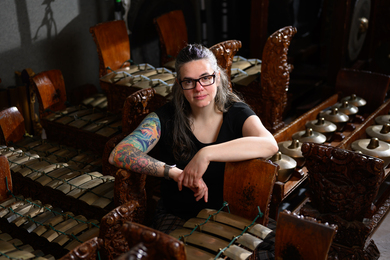In the run-up to the Nov. 4 presidential election, the News Office has asked MIT experts to weigh in on the presidential candidates, their policy ideas and aspects of the campaign. In this installment in the series, members of the MIT community share their thoughts on what should be the next president's top priority in the areas of science and technology.
Emery N. Brown
Professor of computational neuroscience and health sciences and technology
I believe the important scientific questions both candidates have to give serious attention to are global warming, energy and human health. All three of these issues are vital and require focused, concerted attention over the next several years.
Ian Hutchinson
Professor of nuclear science and engineering and head of the Department of Nuclear Science and Engineering
Federally sponsored research sets the nation's overall science and technology priorities. It exerts that influence by enabling or disabling faculty and graduate students and thereby attracting or repelling them from research areas. The recent emphasis on biological and health-related research has opened many fascinating new fields but has left the physical sciences, and particularly nuclear science and engineering, weakened by neglect. The result is a dangerous dearth of talent and expertise in fields critical to the major challenge of the century: sustainable energy. A top priority should be to renew the nation's educational and research talent in physical sciences and engineering.
Marc Kastner
Dean of the School of Science and the Donner Professor of Science
The next president must invest in research on carbon-free energy technologies, not only to limit greenhouse gases, but also for U.S. competitiveness in what is likely to be a huge part of the world economy. However, we know too little of the fundamental science underlying these technologies to implement them safely and economically. Furthermore, the nation's science cannot be strong if there is only support for research obviously related to energy and competitiveness. The new president should make a commitment to broad-based support of basic science, implementing the plan to double the budgets of the NSF and the DOE Office of Science, as well as putting the NIH on a trajectory with reasonable growth.
David Mindell
The Frances and David Dibner Professor in the History of Engineering and Manufacturing and director of the Program in Science, Technology, and Society
The United States stands at the start of a new, if uncertain, era in human space flight. Events of the past five years have thrust NASA and the country into a major transition, exemplified by the impending retirement of the space shuttle. The transition has begun, but how it evolves remains undefined. In its first term, the new administration will make the most important decisions in U.S. human spaceflight in a generation. These include when/how to retire the shuttle, how to transition to the new constellation system, what to do with the International Space Station, and what should be the appropriate scale and goals for a U.S.-led program of human exploration of space. MIT's research group in Space, Policy and Society is preparing a white paper to help chart these choices for the next administration.
Phillip Sharp
Institute Professor
The recent heart-touching national television appeal for funds to advance cancer research by Stand Up to Cancer reminded the country of the need for better treatment of this disease and further research. However, federal funding for cancer research has actually decreased over the past several years. This is at a time when decades of science have uncovered more targets for treatment and there are more drugs and treatments ready for testing in clinical trials than ever before. Further, here at MIT and elsewhere there is a highly promising convergence of engineering and cellular science that will generate new means of diagnosis and treatment of cancer. Thus, the next administration needs to develop a long-term strategy for funding biomedical research that assures as much as possible that better treatments for cancer continue to advance into routine care.
Subra Suresh
Dean of the School of Engineering and the Ford Professor of Engineering
The next administration needs a grand plan for our collective future -- one that will galvanize the talents and enthusiasm of current and future scientists and engineers and support them in their quest to address the major issues of our time. Solutions to the challenges of energy, environmental sustainability and transportation will not come easily. So, too, are the political challenges of reversing the last decade's decline in funding for scientific research. Our next president must bring a long-term, science-oriented perspective into government, and he must quickly and decisively reverse the more recent, opposing trends. The United States's economic leadership has always depended on its ability to foster and maintain an ecosystem of scholarship and innovation in all fields. This system-- our system -- is perilously close to a tipping point. We need leadership that will invest in and help create a future as brilliant as our past.
Rosalind Williams
The Bern Dibner Professor of the History of Science & Technology
You are asking which dish should be served first when science isn't even on the menu. It needs to get back on the table for serious consideration, not as a special interest but as an essential element of every major challenge facing American society. This will not happen if the habits of mind and conduct associated with science and engineering -- curiosity, self-awareness, modesty, accuracy, respect for education -- are dismissed as elitist. A top priority for all Americans -- not just the next president -- is to cultivate these habits and to defend them vigorously. They are as essential for democracy as for science.
A version of this article appeared in MIT Tech Talk on October 1, 2008 (download PDF).





